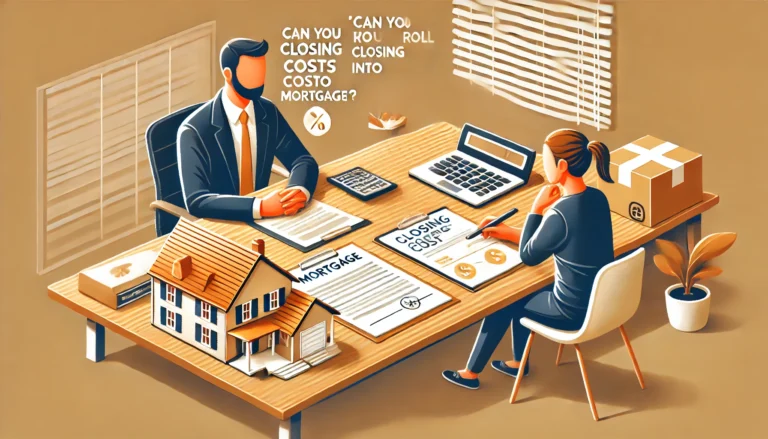What Are Closing Costs?
Closing costs include various fees required to complete your home loan process. These may consist of property tax, mortgage insurance, and charges for services like appraisals. Whether you pay Initial closing costs or roll them into your loan, they significantly affect your monthly payment. Knowing the details helps you plan effectively for your home purchase.

The Role of a Mortgage Lender in Closing Costs
Your mortgage lender plays a vital role in managing closing costs. They calculate the loan amount, interest rate, and associated fees, guiding you on whether to pay Initial costs or include them in your home loan. Working closely with your lender ensures you understand these costs and how they influence your monthly payment and overall loan terms.
Can Closing Costs Be Included in a Mortgage?
Yes, closing costs can be included in a mortgage, allowing you to roll these expenses into your loan. This option helps reduce upfront costs when you buy a home. However, it’s essential to understand that including closing costs in the mortgage increases the loan amount and affects the life of the loan. Your loan type, such as a VA loan, may also determine eligibility for this option.
How to Roll Closing Costs Into Your Mortgage
Review your loan estimate to start rolling closing costs into your mortgage. Discuss with your lender whether your loan type allows including closing costs. Many VA loans, for example, permit this option. This approach reduces upfront costs but increases monthly payments by spreading the closing costs over the loan’s life. Understand your lender’s terms to make an informed decision.
The Process of Including Closing Costs in a Mortgage Loan
Rolling closing costs into a mortgage involves a straightforward process. First, the mortgage lender reviews your loan type to determine if you can include closing costs in your loan. If eligible, the lender adds these costs to your loan amount, increasing your mortgage balance. This option removes the need for upfront payment of closing costs but adds interest on these costs over the loan’s term. Understanding how this choice impacts your monthly mortgage payment and total loan repayment is crucial before deciding
Key Factors to Consider When Rolling in Closing Costs
When rolling closing costs into the loan, consider factors such as your loan type, upfront costs, and the impact on Regular dues. While this option reduces the immediate need to pay for closing costs, it increases the total loan amount, which affects your overall financial plan. Closing costs can range, depending on the type of mortgage, so it’s essential to review your loan estimate and understand how including these costs in your mortgage will influence your long-term financial goals. Always consult your lender for clarity before proceeding.
No-Closing-Cost Mortgage Option
A no-closing-cost mortgage lets the lender cover the closing costs upfront, but it typically adds these fees to your mortgage rate or rolls them into the total loan amount. This option increases your monthly mortgage payments and costs over the life of the loan. Depending on the loan, this choice may be ideal for buyers looking to minimize upfront expenses during the mortgage application process.
Is It Possible to Roll Closing Costs Into a Loan?
Yes, it is possible to roll your closing costs into a loan, depending on the loan type and lender policies. When closing costs are included in the mortgage, you don’t pay them upfront but over time through higher mortgage payments. Be mindful that this increases the total loan amount, meaning you’ll also pay interest on those costs throughout the life of the loan.
Comparing Loan Origination Fees and Other Closing Costs
Loan origination fees are part of the buyer’s closing costs and cover the cost of processing your mortgage application. Lenders may include or roll these fees, along with other closing costs like taxes and appraisal fees, into the mortgage. The fee covers the cost of creating your mortgage, and its impact depends on whether you pay it upfront or add it to the existing mortgage.
How the Purchase Price Affects Your Closing Costs
The home’s purchase price directly influences the cost of closing and the mortgage amount. A higher price increases the buyer’s closing costs and the total loan amount, leading to higher mortgage payments. Payment and closing expenses are calculated as a percentage of PP , which can vary depending on the loan type. Understanding this relationship is crucial for budgeting and managing your mortgage application process.
Tips to Manage and Finance Your Closing Costs

- Explore Loan Programs: Look for loan programs that allow rolling closing costs into your mortgage or adding them to your mortgage balance.
- Negotiate with Lenders: Ask for mortgage discount points or a contribution from the lender to reduce upfront costs.
- Reduce Costs Strategically: Identify ways to lower your closing costs, such as minimizing unnecessary fees or opting for no-closing-cost loans.
- Plan for Long-Term Impact: Consider how financing closing costs will affect your monthly mortgage and overall financial goals.
- Budget for Flexibility: Ensure you have enough funds to cover any costs not included in your mortgage.
Closing Disclosure and Its Importance in Refinancing
Your lender issues a closing disclosure three business days before closing, providing a detailed list of all closing costs. Use this document to review and understand the fees, check if closing costs are rolled into your loan, and confirm the property’s final purchase price. This crucial tool ensures transparency during refinancing and helps you prepare for the closing day without surprises.
Pros and Cons of Financing Your Closing Costs
Your lender provides a closing disclosure three business days before closing, detailing all closing costs. Use this document to review the fees, confirm if closing costs are rolled into your loan, and verify the property’s final purchase price. This tool ensures transparency during refinancing and helps you prepare for the closing day without surprises.
Questions to Ask Your Lender About Closing Costs
When taking out a mortgage, ask your lender key questions about closing costs. Ask about the total costs, ways to reduce your closing costs, and whether you can finance or add the listed closing costs to your loan. Also, ask about private mortgage insurance requirements, the purchase price’s impact, and payment options. These questions ensure you cover these costs wisely and understand your obligations before the closing day.
How Closing Costs Can Be Included in Your Mortgage
When purchasing a home, you can choose to include your closing costs into the mortgage. This means that instead of paying your closing costs upfront, these fees are rolled into your total loan amount. This option, known as financing your closing, allows you to avoid large immediate payments, but it results in paying interest on the closing costs over the duration of the loan. Make sure to discuss this option with your lender to understand how adding closing costs to your mortgage will affect your monthly payments.
Options to Pay for Closing Costs During Home Purchas
There are various ways to pay for closing costs during home purchase. One option is to roll your closing costs into your mortgage, which reduces the need to pay these fees upfront. Another option is to ask your lender to pay some of the closing costs in exchange for a higher mortgage rate. However, be aware that rolling closing costs into your mortgage will increase the total loan amount, meaning you’ll be paying interest on the costs throughout the duration of the loan.
FAQ’S:
Can closing costs be rolled into my mortgage?
Yes, you can roll closing costs into your mortgage with many lenders, but doing so increases your loan balance and monthly payments.
What does financing closing costs mean?
It means including closing costs as part of your mortgage, avoiding upfront payments but paying interest on these costs over the loan’s duration.
Does every mortgage allow rolling closing costs?
No, it depends on the type of mortgage and the lender’s policies. Discuss options with your lender during the loan application.
How can I reduce my closing costs?
You can negotiate with your lender, shop around for better rates, or choose a loan program that offers reduced closing costs.
Will rolling closing costs affect my interest rate?
Yes, rolling the costs into your mortgage may slightly increase the interest rate or overall loan amount.
